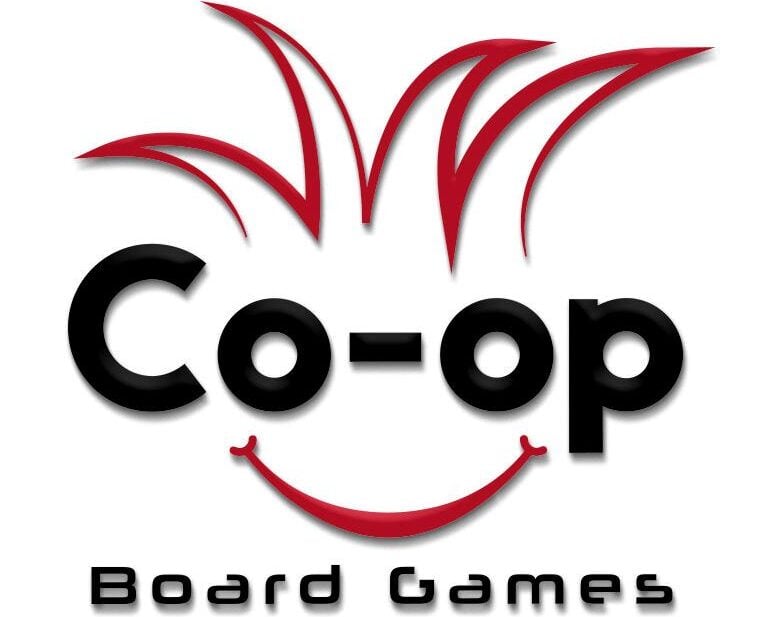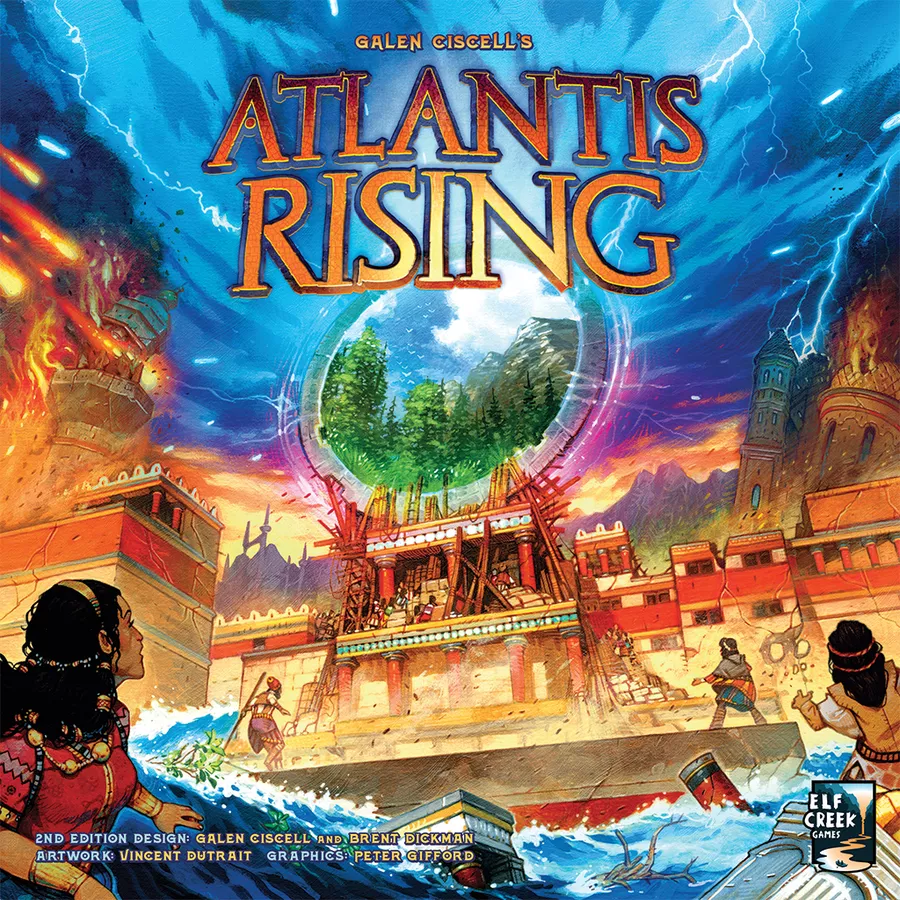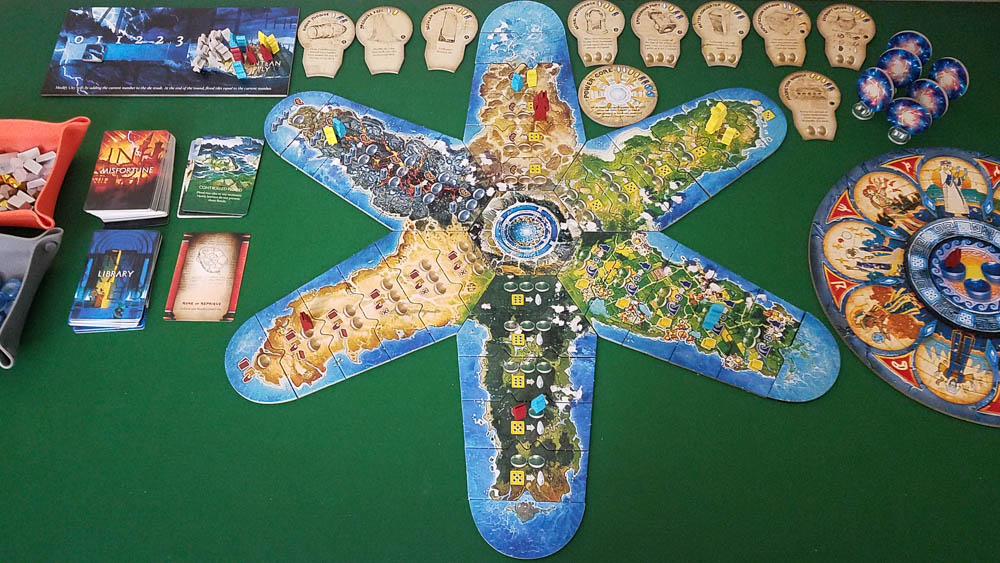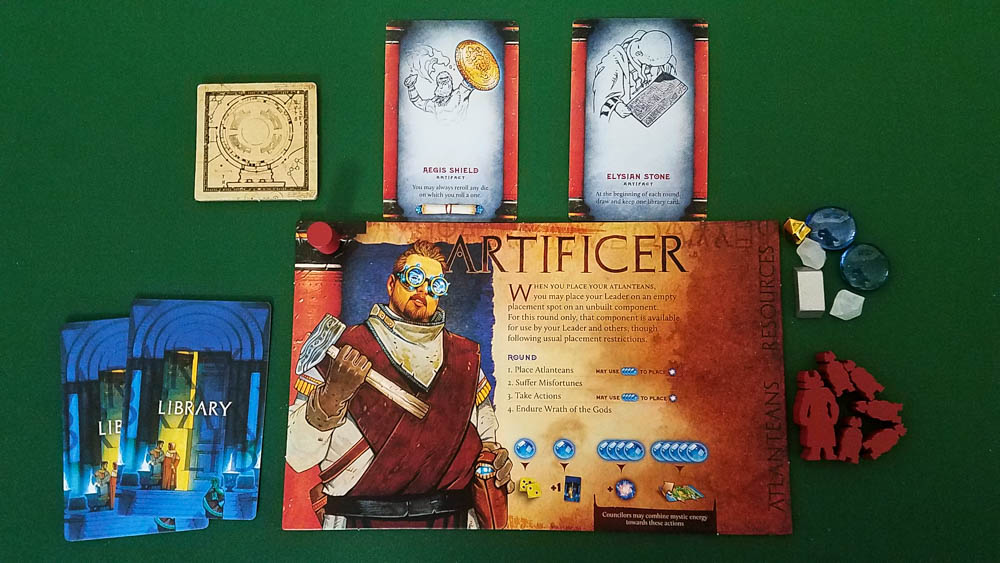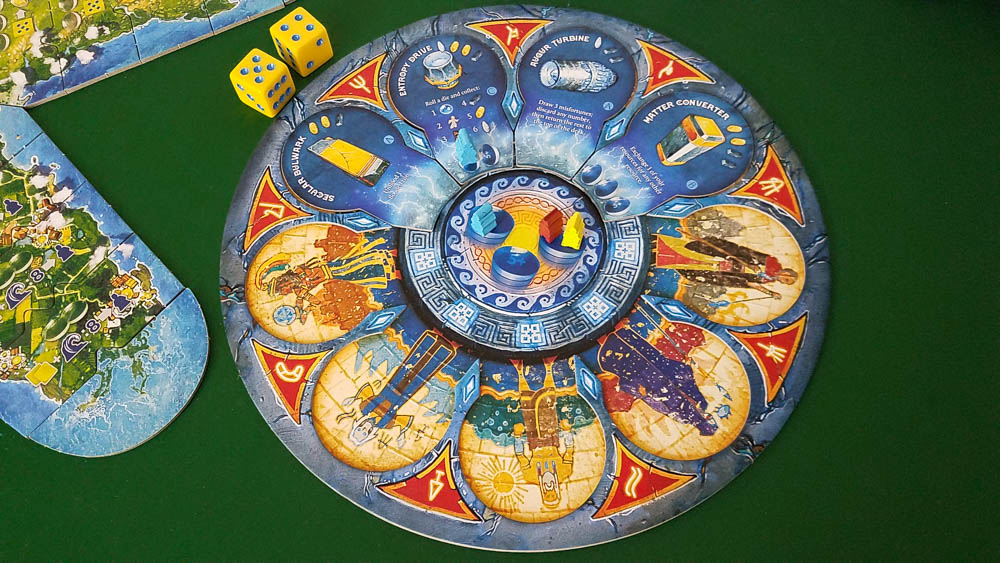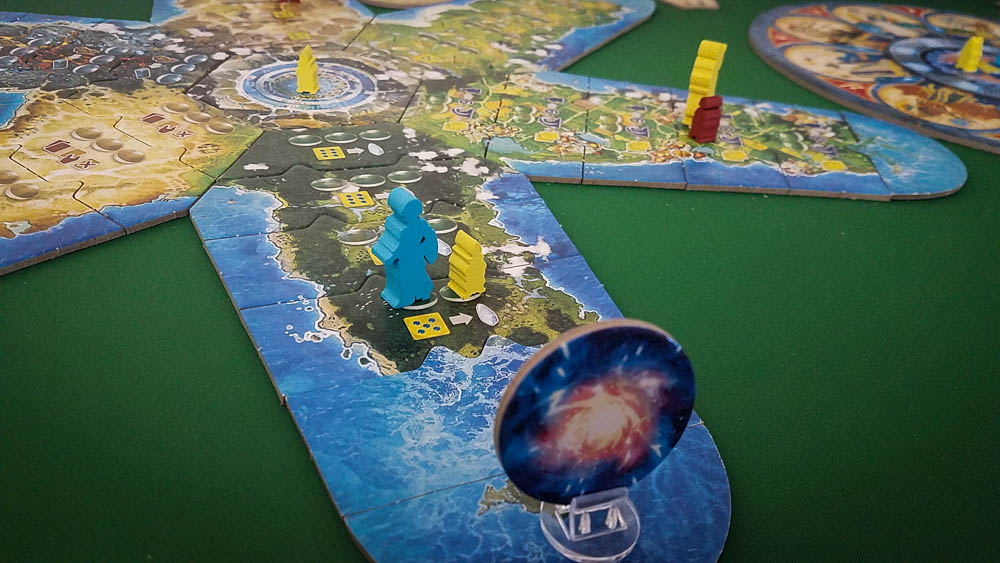Atlantis Rising (Second Edition) Review
Year: 2020 | Players: 1-7 | Minutes: 60+ | Ages: 10+
This Atlantis Rising review was made after playing the game eight times. We were sent a copy of this game by the publisher in exchange for an honest review.
What is Atlantis Rising?
Atlantis Rising (Second Edition) is a cooperative worker placement game in which you’re attempting to gather resources and build a cosmic gate so that you and your people get off of Atlantis before it floods.
This second edition of the game was designed by Galen Ciscell and Brent Dickman, and it is published by Elf Creek Games.
Rules Overview
In Atlantis Rising, you spend each round attempting to pick up the resources that you need so that you can build the Cosmic Gate components and escape before the island sinks. Each player is a unique Councilor who sends their leader and followers out to different parts of the island to gather resources and accomplish other tasks.
The island has a center tile and six peninsulas, and each peninsula is made up of six tiles. The farther a tile is from the center of the island, the easier it is to get resources (lower dice requirements, etc.). However, the outside tiles flood first, so you risk losing actions when you send your followers farther away.
You go to the mountains, the hills, and the forest peninsulas to get ore, gold, and crystal, respectively. The Cities peninsula gets you new followers, the Libraries peninsula gets you new cards with unique abilities, and the Forges peninsula allows you to convert ore into Atlantium.
Each round has four phases:
- Place Atlanteans – There are no turns in this game. Instead, everyone simultaneously places their followers around the island. Usually, you’ll put followers on the different peninsulas to potentially gather resources, get new workers, or get new library cards. Followers can also be placed on the center tile to get mystic energy (more on this below) or on the Cosmic Gate to build one of its components (or to use one of the built components).
- Suffer Misfortunes – In this phase you draw Misfortune cards and, usually, bad things happen. Most of the cards will flood specific tiles (flip them over), but you’ll also sometimes draw Special Misfortunes that have unique negative effects. There are also some Calm Seas cards in the deck that do nothing. If any of your followers are on tiles that flood, they are immediately removed and you won’t get to take those actions in the next phase.
- Take Actions – Any Atlanteans that are still on the board get to take actions, and you can take the actions in any order. Sometimes you’ll roll dice in an attempt to get resources or new workers, and sometimes you just automatically get whatever the location gives. Your leader is exactly like your other followers except that they can activate your special ability.
- Endure the Wrath of the Gods – In this phase you flood a number of tiles (you choose which ones) equal to the current level on the Wrath of the Gods track and then move the counter up one level.
Mystic energy is a very important part of this game. It’s mostly used to modify dice results, but you can also use it to keep additional cards when you go to the Libraries peninsula, to buy Mystic Barriers (these block floods), and to unflood tiles.
Your main focus is on building the components for the Cosmic Gate. When you send followers to the Cosmic Gate board, you discard the required resources for the components and then place the built components on the board. Some of the components give you one-time abilities, while others give you new action spaces that you can use in future rounds.
You’ll win if you’re able to build all of the components for the Cosmic Gate, including the final Power Core component. You’ll lose if the flood ever reaches the island’s center tile.
Pros and Cons
Pros
- To me, the thing that makes Atlantis Rising really stand out is the unique combination of worker placement and push-your-luck. I love worker placement games, and Atlantis Rising has that familiar and satisfying “put your worker here and get stuff” element, but it also brings the tension by threatening to cancel your actions when you get too close to the edge of the island. You want to use those edge tiles, but you constantly have to weigh the pros and cons of the risk. All of that just works so well in a cooperative game.
- This game made me realize how much I like simultaneous action selection and resolution in co-ops. I love that you can take actions in any order, allowing you to get the resources, cards, and mystic energy in any order that you want. It just feels so much better than having to do actions in a specific order.
- There’s something about Atlantis Rising that, in my experience, makes people want to cooperate more than in most other co-ops. There’s constant communication, with players discussing where to place their followers, how they can use their abilities to help the team, the potential risks, and how they can work together to build the Cosmic Gate components.
- The Library cards, along with your leader’s ability, do the job of making you feel like you bring something different and valuable to the team. The artifact cards are especially cool because they give you ongoing abilities that can potentially turn the game around.
- Atlantis Rising looks fantastic on the table. The island looks great, the player boards are excellent, the cards are nice, and that Cosmic Gate board is something special. Artist Vincent Dutrait did a heck of a job.
- This game has so much replay value. Each game you have different counselor abilities, different components to build, and the Misfortune deck and the dice ensure that the game is never predictable. Plus, the rulebook includes ways to easily adjust the difficulty level, which changes the makeup of the Misfortune deck and the difficulty of the components that you have to build.
- Atlantis Rising has played well at every player count I’ve tested out so far. The two-player game adds in a Hologram character that balances the game without adding in additional complexity. I’ve gone as high as six players, which was a longer game, but that was just because we spent more time talking strategy. I’m sure seven-player games work just as well.
Cons
- I’m totally okay with the luck factor of the dice and the Misfortune cards since it’s what makes the game work, but it can definitely cause some frustration. You can have two or more actions canceled in a single round even when you have mystic energy and/or are playing safely. If that happens to you two rounds in a row, you can start to feel like you aren’t getting the chance to contribute.
- There’s a pretty major typo in the setup section of the rulebook that lists the wrong number of followers that go into the reserve in 4-7 player games. It definitely confused me until I found this thread on BGG, which explains the typo and the fix. Unfortunately, some people aren’t going to read that thread and could end up having easier games at those player counts. (Update: This typo has been fixed in newer printings of the game.)
Final Thoughts
Atlantis Rising (Second Edition) is one of my favorite co-ops of the last three years and one of the best light-medium/family-weight cooperative games that I have ever played. I’m a big fan of Stone Age and Forbidden Island, and this is like the perfect blend of those two games. It has the straightforward-yet-satisfying worker placement mechanic, and that rising tension as the island sinks does the job of keeping everyone engaged. I never had a chance to play the first edition of Atlantis Rising, but it seems like all of the changes that they made here were for the better.
Atlantis Rising works for so many crowds. If you’re a fan of worker placement games and you also happen to like co-ops, get this game. If you’re looking for the next step up from Pandemic and other games of that weight, check this one out. I’d also highly recommend Atlantis Rising to anyone looking to find a co-op that plays well at both low and high player counts since this game scales better than most.
- Update: Atlantis Rising is now high up on the Top 40 Cooperative Board Games list!
- Update 2: It also made it onto the Best Co-op Board Games of 2020 list!
- Update 3: It’s also now on the Best 5 Player Co-op Board Games list!
Atlantis Rising Links
BGG | Amazon | Miniature Market
Thanks for taking the time to read our Atlantis Rising review!
Be sure to also take a look at our Best Cooperative Board Games list and other rankings.
Subscribe to our newsletter if you want more co-op board game content sent right to your inbox!
